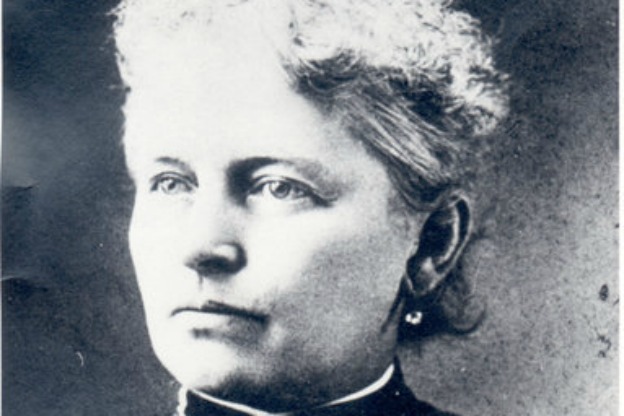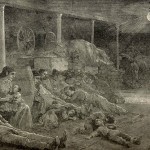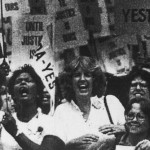Helen Gougar’s name is little-known today, but in the late nineteenth century, Gougar was a national figure. Lecturing across the country on temperance and suffrage, Gougar also wrote, and practiced law in the state of Indiana.
Born in Hillsdale County, Michigan, in 1843, Helen Mar Jackson followed her brother and three uncles to Lafayette, Indiana in 1860. There she began teaching. She was named principal of the public school in 1863, the same year in which she married Lafayette attorney John Gougar.
Helen Gougar soon gave up teaching and became her husband’s apprentice in his law practice. Gougar also wrote a weekly column in the Lafayette Courier; in the 1880s, she owned and operated another weekly newspaper, Our Herald. She became interested in the temperance movement in the 1870s, and it was through that work that she became an ardent suffragist.
Gougar claimed that she was converted to the cause of women’s suffrage upon learning about the death of a mother of four in 1878 from domestic violence. Though Gougar had been “praying away the evil,” incidents like that convinced her that it would be more effective to “vote it away.”
Because temperance and suffrage went hand-in-hand in Indiana, Gougar was able to become involved in party politics in the 1880s and 1890s. When the state and national Republican Party refused to include suffrage and temperance in the party platform in 1888, Gougar switched to the Prohibition Party, which did endorse votes for women.
This involvement in party politics, and particularly her alliance with prohibitionists, put Gougar at odds with some of her suffragist comrades. Susan B. Anthony had deep reservations about linking suffrage with temperance, fearing that the latter would drive away otherwise sympathetic male voters.
Gougar did not stop. In fact, she sued the Tippecanoe County election board for its refusal to allow her to vote in the 1894 election. After so many years of helping her husband with his law practice, Gougar was able to argue her own case before the Indiana Supreme Court: she had been admitted to the Tippecanoe Bar in 1895. She argued that because she was a citizen, the Fourteenth Amendment to the U.S. Constitution ensured her right to vote regardless of language in the Indiana State Constitution limiting the franchise to males twenty-one and older.
The Supreme Court held that whatever their personal views on extending the vote to women might be, the state constitution prohibited it, and the only remedy would be to amend that document.
Gougar died in 1907, well before women got the vote, but her determination and activism surely advanced that cause.
A Moment of Indiana History is a production of WFIU Public Radio in partnership with the Indiana Public Broadcasting Stations. Research support comes from Indiana Magazine of History published by the Indiana University Department of History.
IMH Source Articles:
1. Nancy Gabin, “Fallow Yet Fertile: The Field of Indiana Women’s History,” Indiana Magazine of History 96, no.3 (September 2000): 213-249.
2. Peggy Seigel, “Winning the Vote in Fort Wayne, Indiana: The Long, Cautious Journey in a German American City,” Indiana Magazine of History 102, no.3 (September 2006): 220-258.
Other:
1. Gougar v. Timberlake et al., 46 N.E. 339, 148 Ind. 38 (1897).
2. Women’s Legal History Biography Project, “Gougar, Helen Mar Jackson,”
https://wlh.law.stanford.edu/biopage/?woman_lawyer_id=10337.
3. Renee Stowitzky, “Helen Gougar Biographical Essay,”
https://wlh-static.law.stanford.edu/papers06/GougarH-Stowitzky06.pdf.























